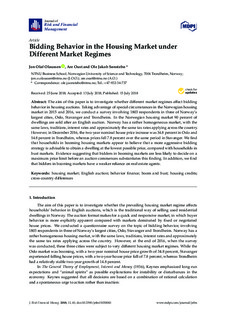Bidding behaviour in the housing market under different market regimes
Journal article, Peer reviewed
Published version
Permanent lenke
http://hdl.handle.net/11250/2564873Utgivelsesdato
2018Metadata
Vis full innførselSamlinger
- NTNU Handelshøyskolen [1619]
- Publikasjoner fra CRIStin - NTNU [37703]
Sammendrag
The aim of this paper is to investigate whether different market regimes affect bidding behavior in housing auctions. Taking advantage of special circumstances in the Norwegian housing market in 2015 and 2016, we conduct a survey involving 1803 respondents in three of Norway’s largest cities, Oslo, Stavanger and Trondheim. In the Norwegian housing market 90 percent of dwellings are sold after an English auction. Norway has a rather homogeneous market, with the same laws, traditions, interest rates and approximately the same tax rates applying across the country. However, in December 2016, the two-year nominal house price increase was 34.8 percent in Oslo and 14.8 percent in Trondheim, whereas prices fell 7.8 percent over the same period in Stavanger. We find that households in booming housing markets appear to believe that a more aggressive bidding strategy is advisable to obtain a dwelling at the lowest possible price, compared with households in bust markets. Evidence suggesting that bidders in booming markets are less likely to decide on a maximum price limit before an auction commences substantiates this finding. In addition, we find that bidders in booming markets have a weaker reliance on real estate agents.

